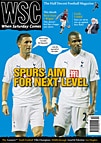 Arsenal are attempting to control their fans' nickname, as Jon Spurling reports
Arsenal are attempting to control their fans' nickname, as Jon Spurling reports
With the media gleefully fanning the flames of boardroom discontent (described as a “civil war” in the Daily Telegraph), the last thing Arsenal need is a protracted conflict with sections of their own support. Yet with the announcement that the club has applied to trademark the word “Gooner”, a damaging legal struggle could ensue. The battle over the club’s financial direction could rumble on for a long time – Arsène Wenger and chairman Peter Hill-Wood’s desire for self-sufficiency within five years is in marked contrast to the David Dein-chaired Red and White Holdings’ urge for a rapid injection of cash. The war against global capitalism in N5, however, was lost long ago. Arsenal’s plan to register a word that was coined by supporters over 30 years ago is further evidence of the club’s frequent heavy-handedness when it comes to exploiting their commercial potential.
In 2002, after “consultation with numerous fans’ groups” (the identity of which remains a mystery), the club crest was rebranded and the motto Victoria Concordia Crescit (Victory Comes Through Harmony) disappeared altogether. Later that year, the European Court of Justice ruled that street trader Matthew Reed could no longer sell goods using the club’s name, shield and cannon emblem outside Highbury. Reed, who had been trading by the ground for 31 years, argued that the logo was a “badge of allegiance”. The High Court upheld Reed’s argument, but the European Court overturned the decision, ruling that Arsenal must be allowed to protect their trademark. The court said there was “risk of confusion in the minds of supporters as to the origins of the products”, and lawyers argued the club had exclusive rights to the names “Arsenal” and “Arsenal Gunners” as well as the team’s shield and cannon designs.
In the current case, the club’s argument appears misguided at best. Kevin Whitcher, editor of fanzine The Gooner, says: “The club has never previously used the word… its origins are indisputably separate from such terms as ‘Arsenal’ or ‘Gunners’.” John Simmons, co-author of The Story of the Arsenal Brand, has warned that the club are in danger of taking the McDonald’s approach, registering so many brands that court cases against fans will inevitably occur.
The term was first used in the early 1970s by Arsenal hooligans (Colin Ward uses the word on numerous occasions in his pioneering kick-lit book Steaming In), before teenage fans began to chant “Ooh to be a Gooner” as Arsenal’s fortunes began to improve under George Graham in the late Eighties. When The Gooner first appeared 20 years ago, it was deliberately edgy and decidedly tatty. Early issues included pieces criticising Graham’s transfer policy, the rising price of season tickets and the building of new executive boxes at the Clock End. In his first editorial, Mike Francis described The Gooner as “a magazine written for Arsenal fans by the fans who really care”. In short, the word symbolised an Arsenal fan who considered himself anti establishment.
Over the last 15 years, the word, rather like the club, has become gentrified. It was used in the official 1998 Arsenal FA Cup final song Hot Stuff, and over the last 12 months such people as Melvyn Bragg, Clive Anderson and Piers Morgan have proudly described themselves as “Gooners”. In a commercial sense, it’s the equivalent of Hugh Dennis’s sad dad dancing in The Mary Whitehouse Experience: attempting to be hip and cool by using words and phrases you don’t really understand, and ending up looking ridiculous in the process.
Nonetheless, the club stand to make millions if the word appears on towels, duvets and alarm clocks. The Gooner’s next course of action remains unclear, but Whitcher claims: “I fail to see how the club has any justification to legally appropriate a word they have never previously used.” Yet a 20-year trail of disgruntled stall-holders and disenfranchised supporters can testify that the guns of the club’s legal and commercial departments are rarely spiked.
From WSC 248 October 2007